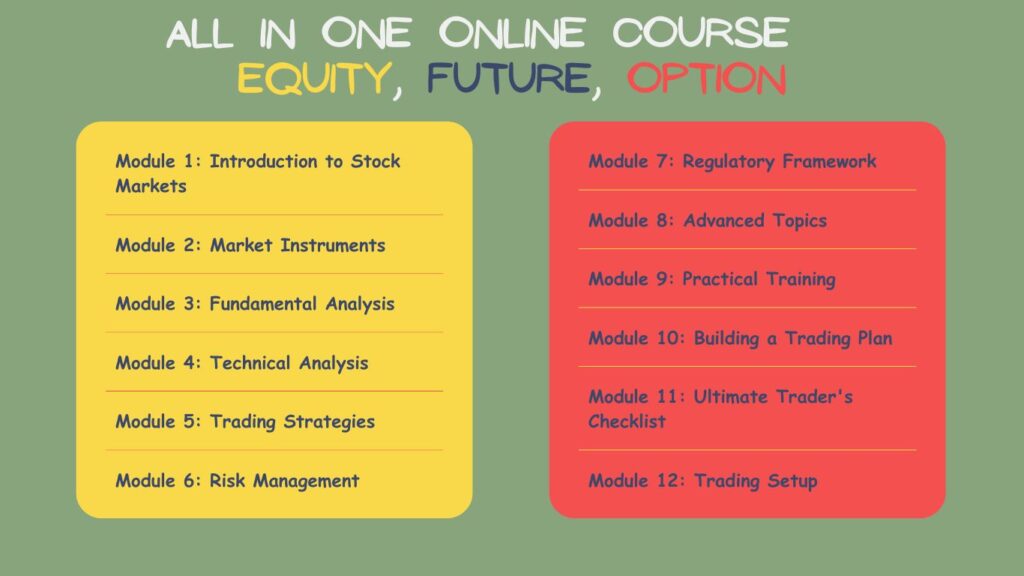
### Module 1: Introduction to Stock Markets
1. **Overview of Financial Markets**
– Understanding the types of financial markets.
– Role and significance of stock markets.
2. **Basics of Stock Markets**
– What are stocks?
– Types of stocks: Common and Preferred.
– Stock exchanges: NSE and BSE.
– How stock markets work.
3. **Market Participants**
– Retail investors, institutional investors, brokers, regulators.
– Role of SEBI in India.
### Module 2: Market Instruments
4. **Types of Financial Instruments**
– Equities, bonds, mutual funds, ETFs.
– Derivatives: Futures and options.
5. **Initial Public Offerings (IPOs)**
– What is an IPO?
– Process and importance of IPOs.
– How to evaluate and apply for IPOs.
### Module 3: Fundamental Analysis
6. **Introduction to Fundamental Analysis**
– Importance of fundamental analysis.
– Key concepts and principles.
7. **Financial Statements Analysis**
– Balance sheet, income statement, cash flow statement.
– Understanding and interpreting financial statements.
8. **Ratio Analysis**
– Key financial ratios: P/E ratio, PEG ratio, ROE, ROA, debt-to-equity ratio.
9. **Valuation Techniques**
– Discounted Cash Flow (DCF) analysis.
– Comparative company analysis.
### Module 4: Technical Analysis
10. **Introduction to Technical Analysis**
– Fundamental vs. technical analysis.
– Basic principles of technical analysis.
11. **Charts and Patterns**
– Types of charts: Line, bar, candlestick.
– Chart patterns: Head and shoulders, double top/bottom, cup and handle.
12. **Technical Indicators**
– Moving Averages, Relative Strength Index (RSI), MACD, Bollinger Bands.
– How to use indicators for trading decisions.
### Module 5: Trading Strategies
13. **Day Trading**
– Intraday trading strategies.
– Tools and techniques for day trading.
14. **Swing Trading**
– Medium-term trading strategies.
– Identifying swing trading opportunities.
15. **Position Trading**
– Long-term trading strategies.
– Position trading vs. investing.
16. **Algorithmic Trading**
– Basics of algorithmic trading.
– Introduction to trading algorithms and automated trading systems.
### Module 6: Risk Management
17. **Understanding Market Risks**
– Systematic and unsystematic risks.
– Risk assessment and management techniques.
18. **Diversification**
– Importance of diversification.
– Strategies for diversifying a portfolio.
19. **Hedging Techniques**
– Using derivatives to hedge risks.
– Practical examples of hedging.
20. **Stop Loss and Take Profit Orders**
– Setting stop-loss and take-profit levels.
– Importance in risk management.
### Module 7: Regulatory Framework
21. **Regulatory Environment**
– Role of SEBI and other regulatory bodies.
– Key regulations affecting stock markets.
22. **Taxation**
– Tax implications of trading and investing.
– Short-term vs. long-term capital gains tax.
### Module 8: Advanced Topics
23. **Behavioral Finance**
– Understanding investor psychology.
– Impact of biases and emotions on trading decisions.
24. **Portfolio Management**
– Basics of portfolio management.
– Asset allocation and portfolio rebalancing.
25. **Global Markets**
– Overview of international stock markets.
– Impact of global events on Indian markets.
### Module 9: Practical Training
26. **Trading Platforms and Tools**
– Introduction to popular trading platforms.
– Using analytical tools and software.
27. **Mock Trading Sessions**
– Simulated trading environments.
– Practicing trading strategies in real-time scenarios.
28. **Case Studies**
– Analyzing historical market events.
– Learning from successful traders and investors.
### Module 10: Building a Trading Plan
29. **Creating a Trading Plan**
– Importance of having a trading plan.
– Elements of a successful trading plan.
30. **Continuous Learning**
– Importance of staying updated with market trends.
– Resources for continuous education (books, online courses, seminars).
